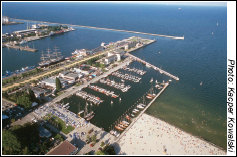 |
|
Gdynia - a City from the Sea
|
By Malgorzata Dehmel
On 22 September 1922 the Polish Parliament
passed the Law on the construction of a port in Gdynia.
In 1938 Gdynia was the largest and most modern port on the
Baltic Sea. The success was possible due to an alliance
of private and state capital and a far-sighted policy. Gdynia
is one of few world examples where the port triggered the
development of a city.
 Gdynia
wants to give a powerful impetus to the further development
of the port. The availability of sufficient space is vital.
Both the quality of the environment and the livability of
the area must improve simultaneously with the growth of
the economy. Furthermore, knowledge and information will
become increasingly important prerequisites for the success
of the 21st century modern port and city. Gdynia
wants to give a powerful impetus to the further development
of the port. The availability of sufficient space is vital.
Both the quality of the environment and the livability of
the area must improve simultaneously with the growth of
the economy. Furthermore, knowledge and information will
become increasingly important prerequisites for the success
of the 21st century modern port and city.
The city's spatial development has always
been influenced by the port's economy. These inter-relations
are best observed in the waterfront zone of utmost investment
attractiveness.
Gdynia's economy though widely diversified is still port-dependent.
The port cuts right into the heart of the city, which results
in the lack of land reserves for further expansion. One
of such areas borders the city centre and the eastern part
of the port - Miêdzytorze. The area's future use should
serve: the port to gain land reserve for its future development,
and the City to realize the extension of already existing
city functions.
The city ensures that the above mentioned
interests do not compete with or diminish potential gains
for the city as a whole. Clearly, a means must be found
to create benefits for all aspects of the area including
the interests of both the Port and the City.
The centre of the city lies at the foot of
the sea. City functions such as housing, services, recreation
are strongly connected with the human scale and areas dedicated
to pedestrians. A harbour is most often a closed territory,
where the highest importance is given to cargo, cranes,
warehouses and other elements of port super-structure. Waterfront
areas and their direct hinterland need to be a combination
of port-connected activities and city functions, taking
into careful consideration transportation serving both of
them.
|
Further information:
Ms Malgorzata Dehmel
Senior Specialist Economic Policy and Real Estate
Department,
Gdynia City Hall
Phone:+48 586220868
E-mail: m.dehmel@gdynia.pl
|
|
|